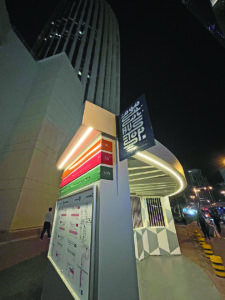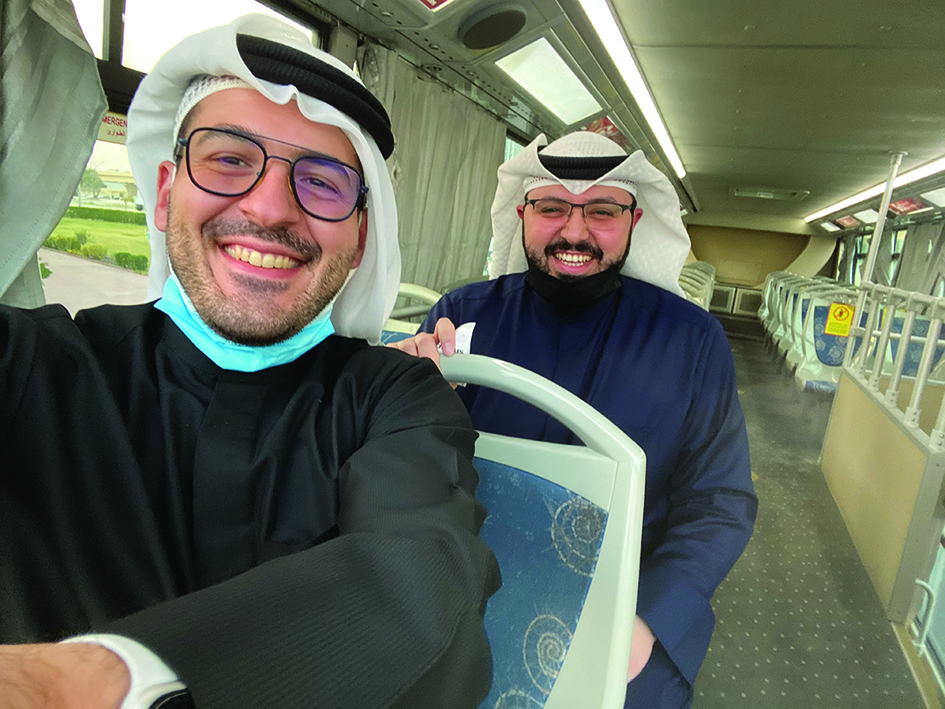By Faten Omar
KUWAIT: Taking the bus has personal, environmental and societal benefits. Riding the bus can improve health, reduce air pollution, lead to fewer traffic jams and help the economy. Jassim Al-Awadhi, founder of the Kuwait Commute initiative, works to raise awareness about the public transport system in the country to implement a feasible and executable solution to improve Kuwait's rapidly escalating traffic issues.
In an interview with Kuwait Times, Awadhi affirmed that he aims to develop Kuwait's bus facilities to keep pace with the development and progress of high-quality world-class systems, along with encouraging citizens to use public transport instead of cars.
"Buses routes in Kuwait are only suitable for workers, as the service is focused only on routes with a passenger density that enables bus operators to profit, which results in a lack of buses in high- and middle-class residential areas because it is unprofitable for them. Public transport is a public service that requires subsidies, which makes systems in Japan, London, Paris and Singapore successful. Also, there is no active central authority to regulate, support and provide the necessary infrastructure for the public transport sector and control the quality of service. The service must be provided to and target everyone," Awadhi noted.
 The new bus stop.
The new bus stop.Develop mass transportation
He stressed that all segments of society are reacting to the campaign "Kuwait Commute - Where is the bus?", adding that the initiative is placing this issue on the table of the government and private sector to develop mass transportation in Kuwait. Awadhi reached out to all stakeholders in the public and private sectors by presenting a well-studied vision to reduce road congestion, highlight the lack of parking spots and the need to increase the number of buses and routes to develop the current system, in addition to educating the community about the benefits of using public transportation.
Awadhi said his initiative is working to raise public awareness through the media, lectures and discussions at universities, and working with all bus operators, Kuwait Municipality, Public Authority for Roads and Transport, National Assembly members and NGOs, hoping to change people's views of public transportation.
"One of the problems the bus industry faces is the lack of Euro 5 diesel, so we have collaborated with City Bus to add a diesel additive produced by Imdad from used cooking oil. The first stage of the experiment is to test the mixture to see if it is useable. The second stage is to send the sample to a lab in the UAE to check if it is compatible, and if it is useable as a diesel additive, we are going to use it and record the findings. Next Tuesday we will get the lab result," Awadhi told Kuwait Times.
Regarding issues related to bus routes, Awadhi said: "Bus operators are doing the best they can with what is available. Allocating bus lanes, providing the necessary infrastructure and setting a timetable from the central regulator will complement bus operators' efforts in expanding the network, increase the number of buses and reach new areas, while reorganizing other routes."
"Public transportation has to be available for us to use. I use public transportation weekly but it does not serve me well, because the network does not cover all of Kuwait. I used to live in Grenada at the end of the Fourth Ring Road and my destination was Salmiya. By car it took me 22-25 minutes, but by bus it took me two hours. The main problem is the last government development of public transport as a public service was more than 40 years ago, and until today there have not been any improvements to it," he said.
Bus stops redesign
Awadhi worked to redesign several bus stops in cooperation with citizens, public and private sectors, and activists. "As an activist, I introduce ideas and issues related to public transportation in Kuwait to engage the society with us and spread awareness in order to make officials begin cooperating with us. Kuwait Commute has been successful so far - our efforts have been sustainable for four years."
"Kuwait Commute started an open call design competition for a bus stop in cooperation with several private companies. We wanted the bus stop to be a safe and comfortable zone for waiting. We chose the location and included elements of design sustainability as much as we could. We thought it was very important for us to develop a bus stop that was fit for purpose," he told Kuwait Times.
He added shaded bus stops are better than air-conditioned ones, where there is an added cost, maintenance and security risk. "We collaborated with other activists. The Mahboula bus stop was done by Jassim Al-Nashmi, founder of Manmade Studio, and we are exchanging experiences to understand other structural aspects regarding bus stop design. Kuwait Foundation for the Advancement of Sciences is going to provide unified designs for bus stops. We signed the contract with KFAS and started the process to choose an engineering firm in Kuwait that has experience in bus stops, which will be launched soon," Awadhi said.
Awadhi confirmed the bus system is one of the most important complementary projects to the future of the Kuwait metro. "With no good buses, there will be no metro in Kuwait. We read the report by an international consultant for Kuwait, who highlighted six scenarios for the public transport system, with buses being part of each of them. So we have to fix the buses to have a metro, because how are people supposed to reach metro stations from homes if there is no effective bus network?" he asked.
"'Where is the bus?' calls on the government and private sectors to show their actions to develop this public service. Since 2018, Kuwait Commute has tried to contact them to build a relationship and close the gaps in this ongoing process to have a public transportation system that is safe, eco-friendly and reflects Kuwaitis' values," Awadhi concluded.











